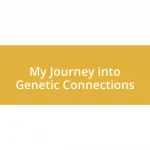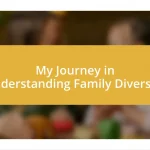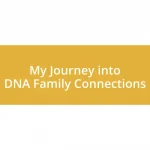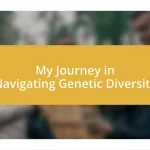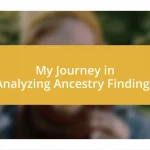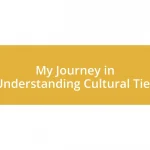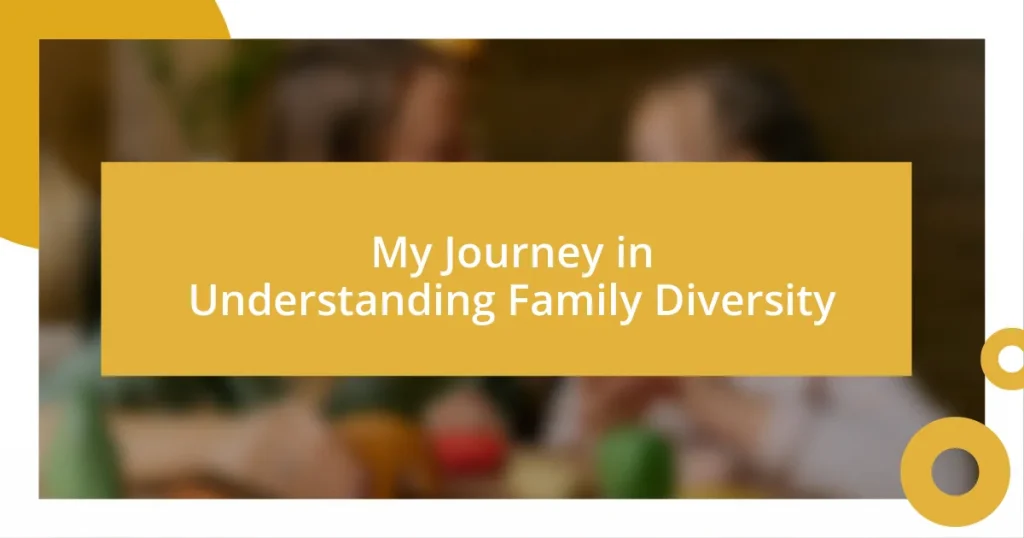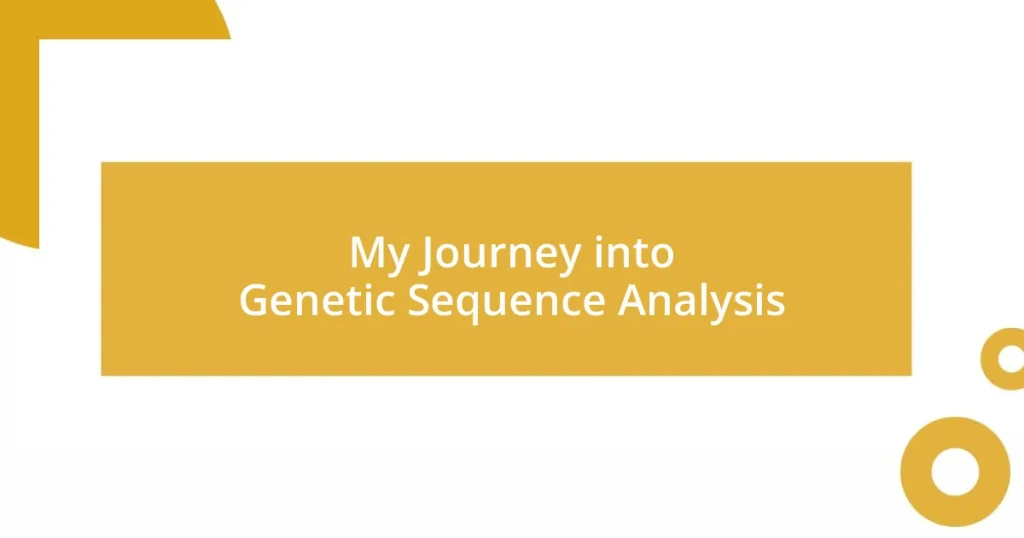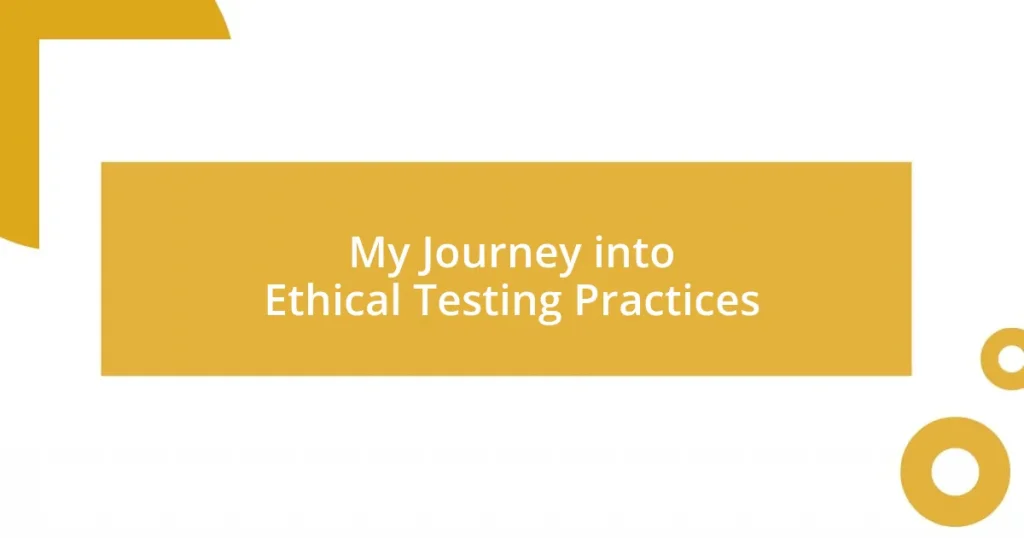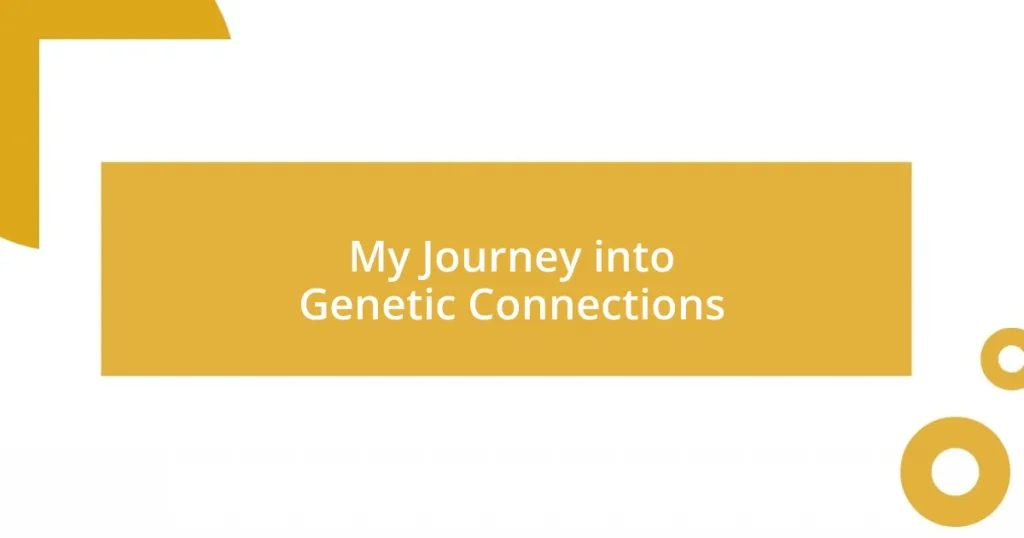Key takeaways:
- Family diversity includes various structures such as single-parent homes and blended families, emphasizing that love and support define family beyond traditional norms.
- Understanding family diversity promotes acceptance, empathy, and enriches communities by challenging societal stereotypes and fostering inclusivity for all family types.
- Cultural influences shape family dynamics and traditions, highlighting the importance of celebrating diverse practices while emphasizing shared human experiences.
- Strategies for embracing family diversity include active listening, participating in cultural events, and integrating education on different family structures to cultivate understanding and compassion from a young age.
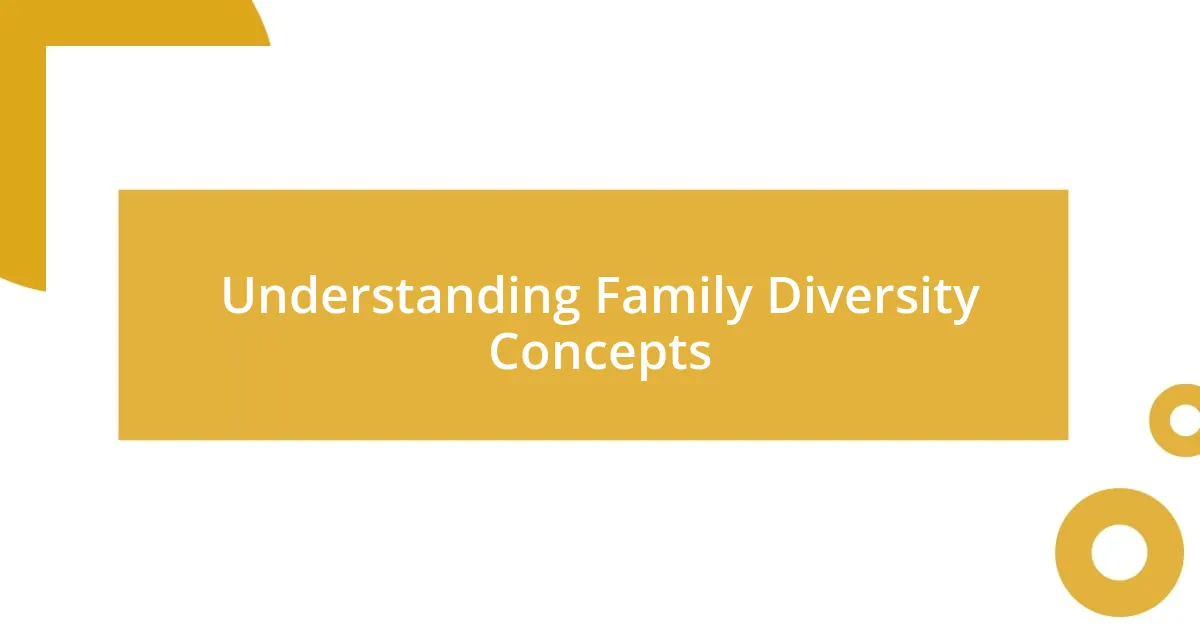
Understanding Family Diversity Concepts
Family diversity encompasses various family structures, including single-parent homes, blended families, and families formed through adoption. I remember a time when a close friend shared her struggles as a single mom. Listening to her, I realized that family can mean love and support in many forms, regardless of the traditional nuclear model we often envision.
When I think about family diversity, I can’t help but reflect on the unique dynamics that emerge from different backgrounds. For example, a multicultural family I once knew beautifully blended traditions from both parents’ cultures, which enriched their children’s lives in ways I hadn’t considered before. Doesn’t that make you wonder how these diverse influences shape identity and values?
Moreover, the emotional bonds within families can sometimes outweigh the blood ties. I’ve seen friends who found familial love in their friendship circles, providing a sense of belonging that their biological families may not have offered. This makes me question: isn’t love and support the true essence of family, regardless of its structure?
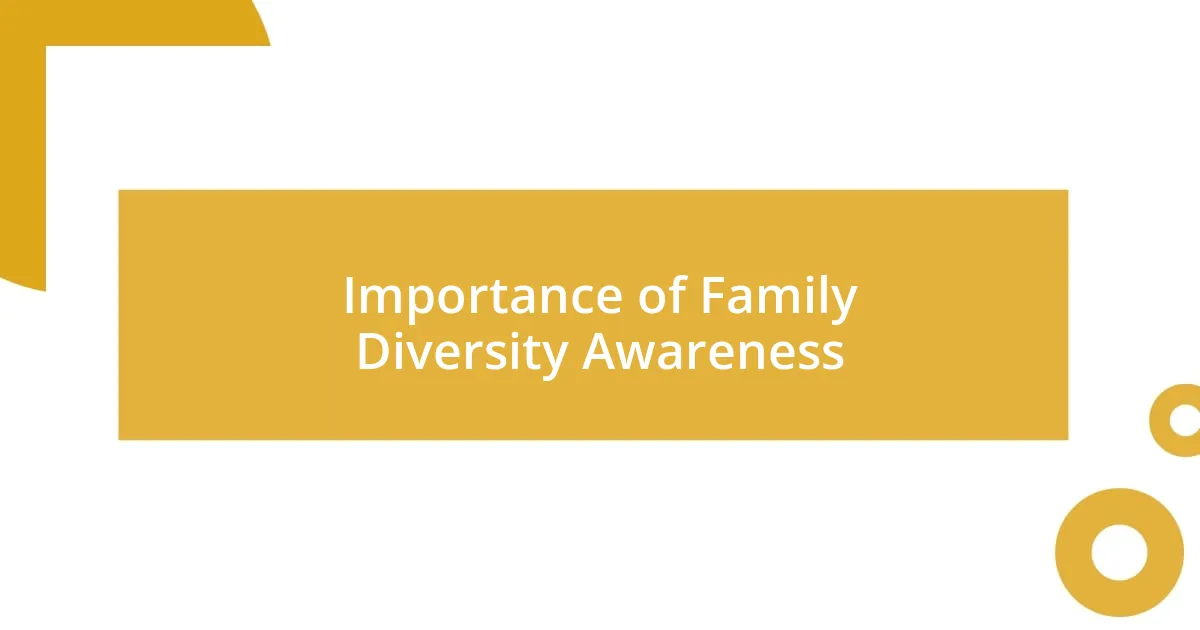
Importance of Family Diversity Awareness
Understanding family diversity is crucial because it promotes acceptance and empathy in our increasingly interconnected world. I remember attending a community event where people shared stories about their unique family experiences. Hearing these stories opened my eyes to the challenges and joys families face beyond my own experience. It made me realize that understanding different family setups enriches our communities by fostering respect and inclusion.
Another aspect of family diversity awareness is its impact on children’s development. When children grow up in environments that celebrate variety, they learn to appreciate differences early on. For instance, I once volunteered at a school with a diverse student body. Watching the kids interact, I noticed how they effortlessly embraced one another’s backgrounds, which led to a supportive atmosphere. This experience reinforced my belief that family diversity lays the foundation for a more harmonious society.
Finally, recognizing family diversity helps to challenge societal stereotypes and promotes social justice. Just the other day, I encountered an article discussing the trials faced by families headed by LGBTQ+ parents. It reminded me how essential it is to confront biases and advocate for equal rights for all types of families. Recognizing the validity of each family structure empowers individuals to stand up for fairness and equity, making our world a better place for everyone.
| Aspect | Traditional Family | Diverse Family |
|---|---|---|
| Structure | Nuclear (Parents and Children) | Varied Structures (Single-Parent, Blended, Same-Sex Parents, etc.) |
| Cultural Exposure | Limited to One Culture | Rich in Multiple Cultures and Traditions |
| Social Acceptance | Common but Potentially Limited Understanding | Challenges Stereotypes and Promotes Inclusivity |
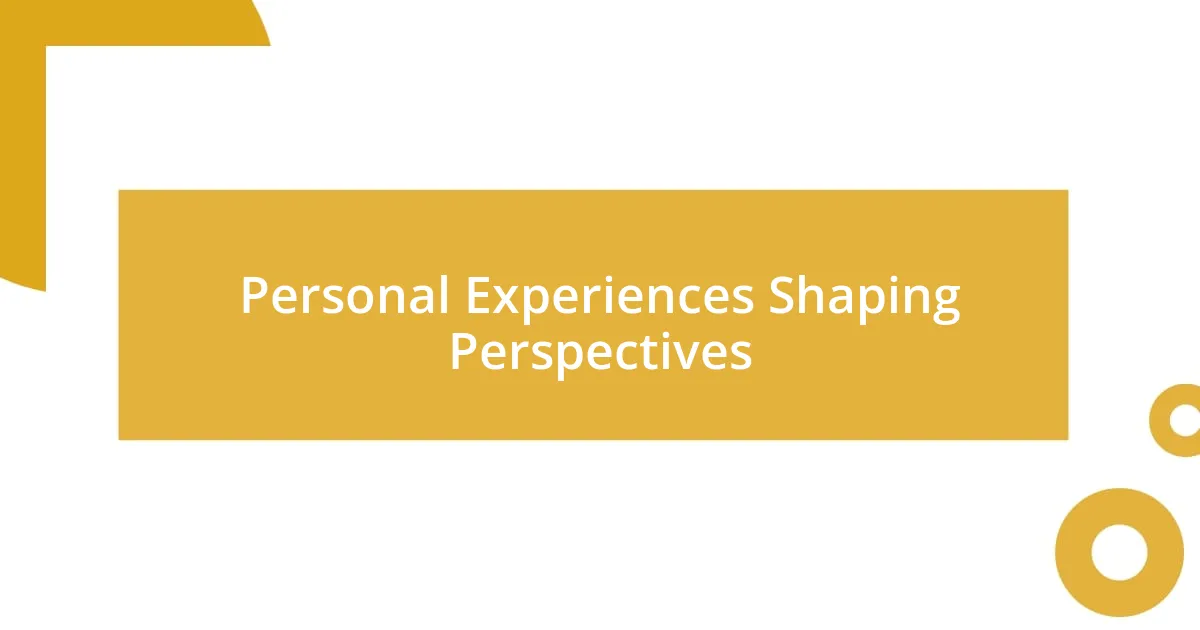
Personal Experiences Shaping Perspectives
Reflecting on my own journey, I can’t help but appreciate how my experiences shaped my understanding of family diversity. I vividly remember an eye-opening moment when my cousin introduced her partner at a family gathering. I had always viewed family through a singular lens, but seeing them together—not just as a couple but as a loving family—made me realize that families can exist beyond convention. This personal revelation expanded my view of love and support, and it underscored that the essence of family isn’t defined by societal norms.
- Participating in a community art project, I met families from various backgrounds. Hearing their stories felt like peeling back the layers of my own experiences.
- One family shared their journey of adopting a child from another country, demonstrating that family bonds can be forged through shared love rather than biology.
- I felt a deep resonance when they spoke about the joy and challenges of blending different cultural practices into their daily lives.
Through these moments, I’ve learned that our unique experiences, even ones that seem small, can profoundly influence our understanding of family. Each encounter deepens our perspectives, reminding us that love transcends labels and traditional boundaries.
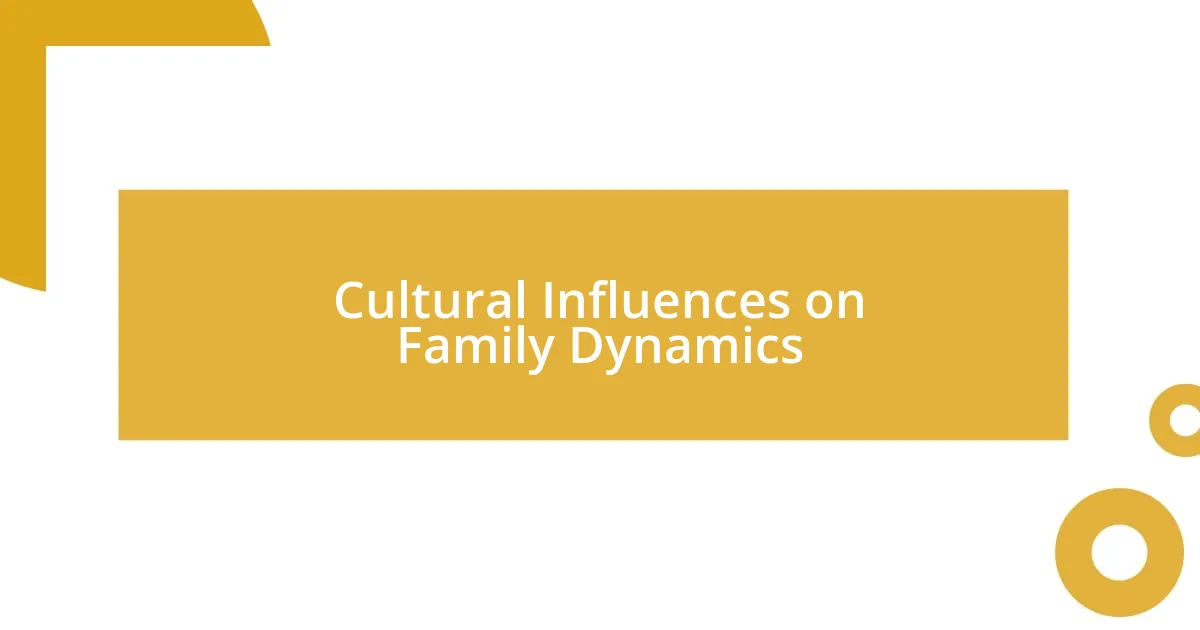
Cultural Influences on Family Dynamics
Understanding how culture shapes family dynamics has been one of the most enlightening aspects of my journey. I remember a day when I spent time with a friend whose roots were in a tight-knit Asian community. Their dinner ritual was a vibrant display of traditions, where everyone—from grandparents to young children—had roles to play in preparing the meal together. Witnessing this harmonious collaboration highlighted how cultural values can reinforce familial bonds, and it made me ponder: how can we celebrate our unique cultural practices without losing sight of our common humanity?
Another powerful moment unfolded during a cultural exchange program I participated in. I met a family who blended traditions from their African heritage with American customs. Sharing their dual celebrations—like combining Thanksgiving with an African feast—allowed them to embrace aspects of both cultures. This experience resonated deeply with me and made me question how we can encourage families to share their traditions widely, enriching our collective social fabric. It seems to me that these blended experiences not only strengthen family ties but also create opportunities for understanding and appreciation among diverse communities.
Family dynamics are also significantly shaped by beliefs and values passed down through generations. Reflecting on my own upbringing, I often considered the emphasis my parents placed on open communication and emotional support. It struck me that families from cultures emphasizing collectivism might prioritize these differently. How do these varying approaches to communication affect the day-to-day lives of families? My conversations with friends from different cultural backgrounds provided insights characterized by a tapestry of expressions, showcasing the richness that diversity brings to family interactions. Ultimately, I find that every cultural influence contributes a unique thread to the intricate weave of our shared human experience.
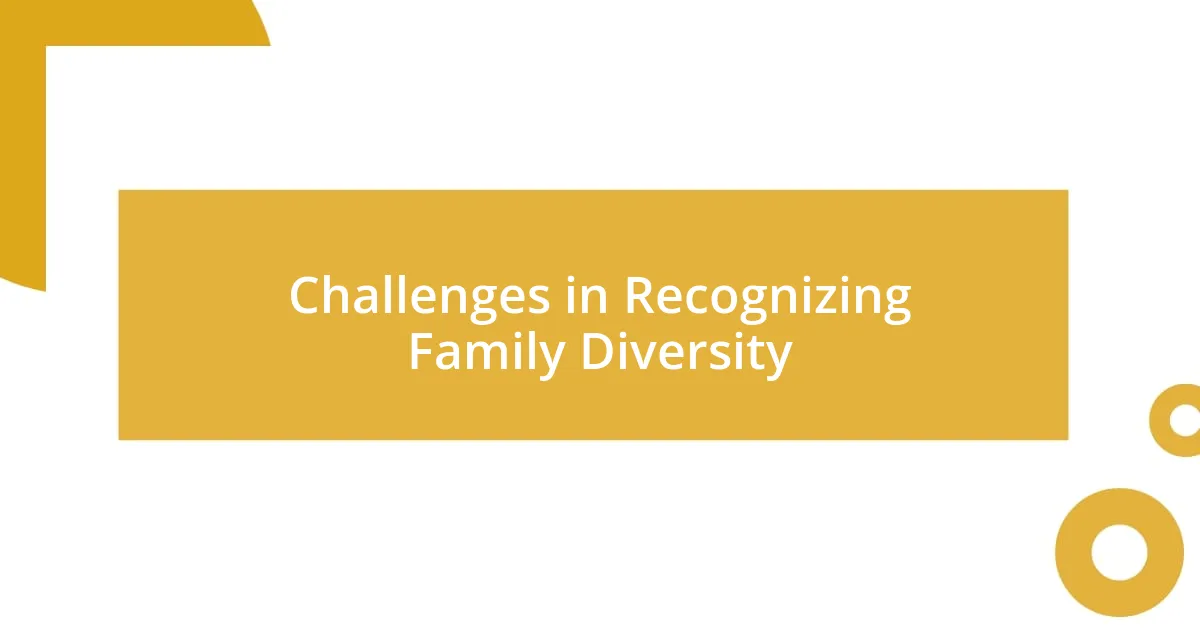
Challenges in Recognizing Family Diversity
Recognizing family diversity often bumps into personal biases and preconceived notions, something I’ve grappled with myself. I recall a conversation I had with a close friend who identified as non-binary. Initially, I struggled to understand and accept their perspective on relationships and family roles. It made me question: how many assumptions am I making about what constitutes a family? This realization showed me that my definitions were far too narrow, leading me to confront my own emotional reactions when faced with unconventional family structures.
Moreover, societal expectations often pressure us into seeing families through a traditional lens. I once attended a community forum where a speaker passionately shared their experience of raising children with a partner of the same sex. The discomfort in the room was palpable, and it struck me how ingrained stereotypes hindered open dialogue. If we only focus on how families are “supposed” to look, are we missing the richness of the stories they have to tell? This experience helped me grasp that understanding family diversity requires a willingness to step outside our comfort zones.
Finally, the challenge of recognizing family diversity is further compounded by a lack of representation in media and literature. I remember reading a book that featured a family led by a single father, a scenario I hadn’t encountered before. The emotions it evoked in me were profound, as it sparked my curiosity and empathy. Why hadn’t I seen more stories like this? It became apparent to me that when we don’t see diverse families reflected back at us, it can create a sense of isolation for those who exist outside the traditional paradigm. Shifting this narrative is essential for promoting genuine understanding and acceptance.
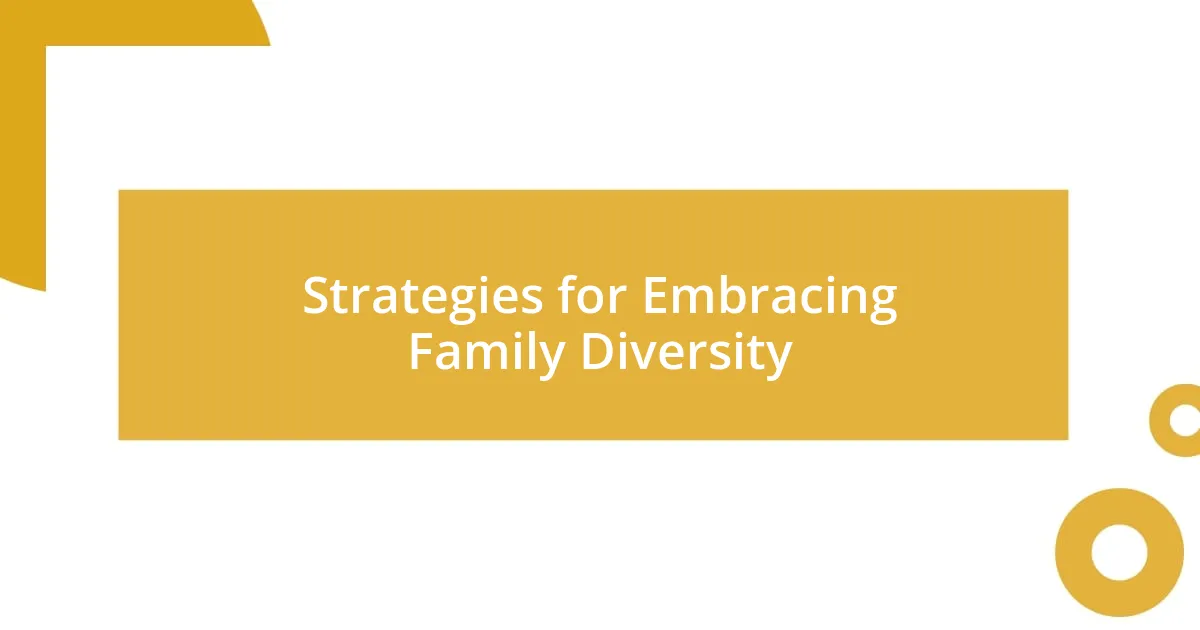
Strategies for Embracing Family Diversity
Embracing family diversity begins with actively listening to the stories of others. I remember attending a family gathering where diverse backgrounds were proudly represented. As each family member shared their unique experiences, I was struck by the tapestry of identities that made up our community. How often do we give others the space to express their truth? This practice of deep listening not only fosters respect but also paves the way for connections that transcend differences.
Another strategy that I’ve found effective is participating in community events that celebrate various cultures. At a recent festival, families showcased their heritage through food, art, and music. I joined in a cooking class from a family who graciously shared their traditional recipes. It was eye-opening, both in understanding their culture and in building communal ties. It made me question, why wait for an occasion to learn about others? If we engage regularly with different communities, we can create an environment of acceptance and inclusiveness.
Lastly, I believe in the power of education in acknowledging family diversity. I once volunteered at a local school where I helped implement a curriculum focused on different family structures and cultural backgrounds. Watching children absorb these ideas and discuss them openly made my heart swell with hope. Why shouldn’t our future generations grow up seeing every type of family as valid? Through education, we can reshape perceptions and cultivate compassion from a young age, ensuring that diversity isn’t just tolerated but celebrated.
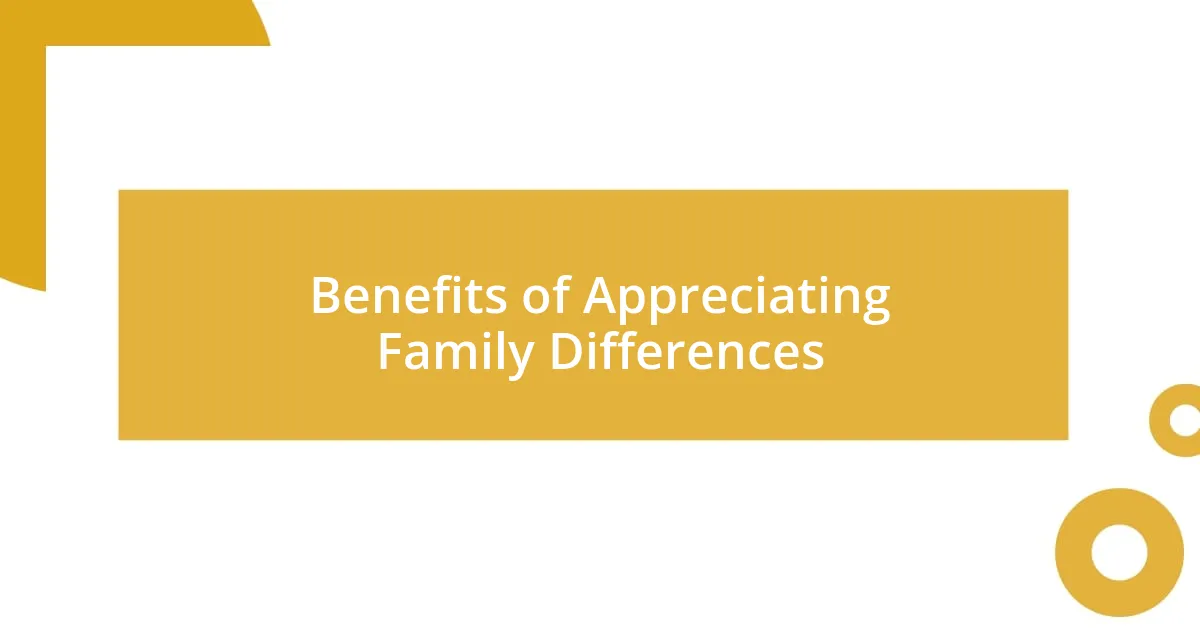
Benefits of Appreciating Family Differences
Appreciating family differences opens the door to deeper connections and understanding within our communities. When I began to engage with various family structures, I noticed how rich and varied human experiences truly are. For instance, I once celebrated Thanksgiving with a family that blended multiple cultures. Their traditions were a spectacle of joy and love, sparking my curiosity. How often do we allow ourselves to be surprised by the beauty in our differences? It reshaped my view on what a joyful gathering could look like and helped me forge friendships that crossed cultural boundaries.
Moreover, embracing family diversity has profound implications for emotional growth. I can recall a heartfelt moment at a friend’s birthday party where families from different cultural backgrounds shared their unique traditions. The laughter and stories gave me insight into hardships and triumphs I had never imagined. I started to reflect: shouldn’t we all strive to learn from each other’s experiences? This mixing of perspectives not only enhances our empathy but also cultivates resilience in facing our own challenges together.
In addition, appreciating these differences encourages a more inclusive mindset, both personally and within our societies. I’ve seen firsthand how acknowledging the varied family dynamics helps us to challenge stereotypes. A few years ago, I joined a community dialogue about non-traditional families, and it proved to be an enlightening experience. Listening to various voices recount their journeys opened my eyes to numerous misconceptions I held. Why do we allow assumptions to overshadow reality? Recognizing family diversity makes us more accepting and helps create a foundation for a society that celebrates every form of love and kinship.


